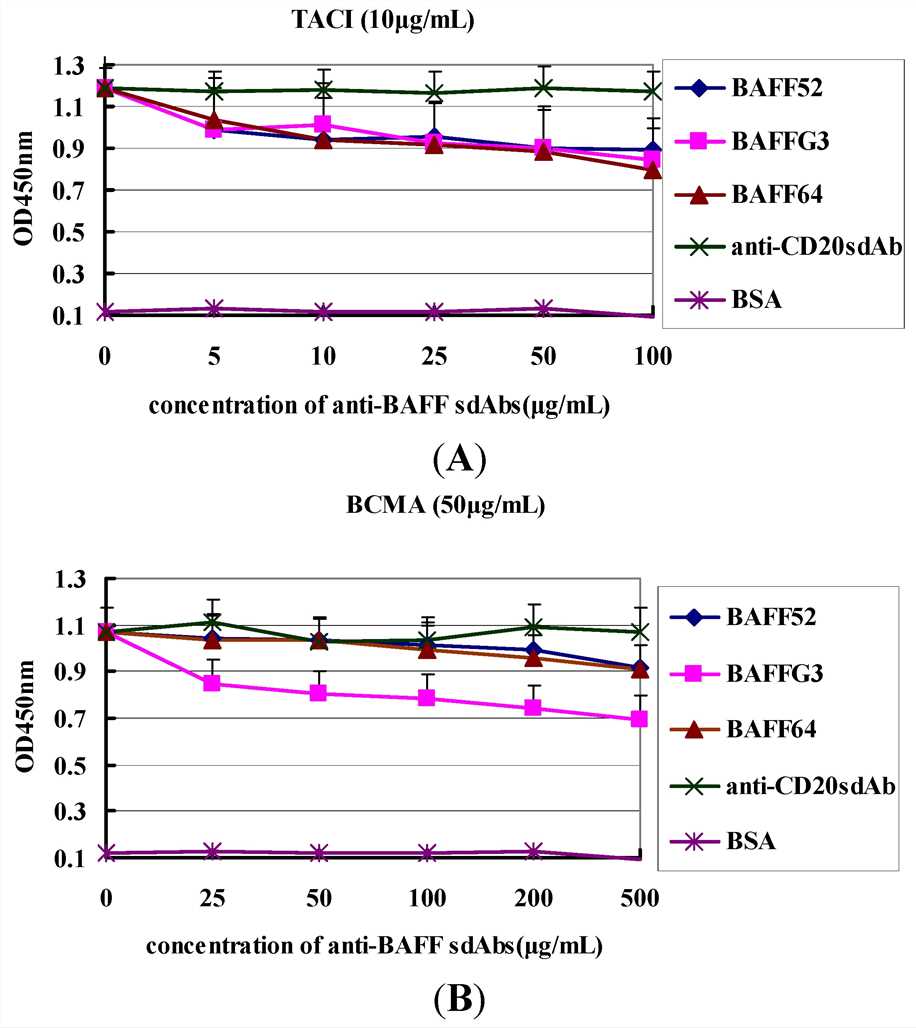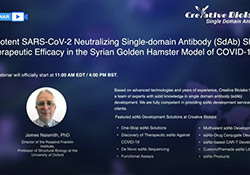Custom Antigen Design and Preparation Services
Soluble Protein Antigen Peptide Antigen Hapten Intact Membrane Protein Antigen Whole Cell Antigen DNA Antigen Custom Camelid Fc-Fusion Protein Antigen Case Study Published Data FAQ Resources
Creative Biolabs is one of the well-recognized experts who are professionals in high-quality antigen design and preparation. Selecting the proper antigen is one of the most critical steps for a successful single domain antibody (sdAb)
development project. According to the different targets and expected applications, antigens may need to be designed and prepared in a variety of formats. With over ten years' extensive experience and advanced antigen preparation platforms, our scientists
are confident in designing the best-fit antigens for your project and preparing them in a high-quality manner.
For a typical VHH development project, we can start with either the in silico sequence of the targets or the provided antigens from your side. Based on your project objectives and the target of interest, our scientists are pleased to design
and prepare various antigen forms to contribute to the further development processes, which include but are not limited to:
Soluble Protein as Antigen

Soluble protein (> 10 kDa) is one of the most commonly used antigens for VHH development, which includes both recombinant protein and naïve protein. In most cases, soluble proteins can form proper conformation, and their complex structure and size
also enable them to trigger the desired immune response.
Our scientists can employ a series of expression systems (e.g., bacterial and mammalian) to generate soluble proteins with desired properties and conjugations, which can be used as qualified antigens for VHH development.

Peptide as Antigen
As a viable alternative to protein antigens, the peptide antigens present great potential for antibody generation. In general, the most common and optimal peptide length for antibody production is around 8–25 residues. With the conjugation of carrier
proteins (e.g., KLH, biotin, and BSA), such peptides can function as immunogens for VHH development. Virtually, peptides with appropriate post-translational modification have been employed as antigens for almost all PTM-specific antibody development
projects.
Our scientists can offer the intact peptide antigen preparation based on the provided in silico sequence. Or we can provide custom conjugation services to the provided peptides.

Hapten as Antigen
Hapten antigens are small molecules that are antigenic (can be recognized by specific antibodies) but not immunogenic. The "free" hapten cannot elicit immune responses until it is combined with larger carriers (e.g., protein). Some typical haptens include
aniline, urushiol, hydralazine, and digoxigenin.
Specific VHH against a hapten can only be raised through properly designed hapten-carrier conjugation and adjuvant. Our scientists have extensive experience in handling such projects and are pleased to tailor the best-fit proposal for hapten antigen preparation.

Intact Membrane Protein as Antigen
Membrane proteins (such as ion channels, receptors, and transporters) play a critical role in multiple biological processes and also represent a large number of drug targets. While, because of their low natural abundance and highly complicated structure,
the preparation of intact membrane proteins without great influence on their conformation is still a big challenge.
Creative Biolabs has established a powerful platform for membrane protein generation. In terms of multiple cutting-edge technologies, our scientists can generate high-quality membrane proteins as qualified antigens for VHH development.
Whole Cell as Antigen
Cell lines overexpressing the target of interest can also be employed as antigens for VHH development. In this case, another cell line from the same host strain that does not express the target is required as a negative control. Whole cell antigen can
benefit from naïve antigen formation, higher immunogenicity and also avoid the complex purification process of the target (extracellular domain), which is an alternative option for the development of anti-membrane protein VHHs.
Our scientists can culture the provided cell lines with your specific protocol or provide comprehensive cell line construction service for your project.
DNA as Antigen
For antigens that are difficult to express or purify, DNA immunization would be a wonderful choice to permit in vivo antigen production and trigger the desired immune response. This approach can maximally maintain the naïve conformation of
targets and also some post-transcriptional modifications.
Based on the provided in silico sequence, our scientists can construct a DNA plasmid encoding the target as an antigen or take advantage of our unique Magic™ platform to enhance the transfection efficiency and induce a robust immune response.
We can also start with the provided DNA plasmid.

To overcome difficult problems such as small antigens and tag immunogenicity, our scientists with extensive experience could provide a unique series of camelid (e.g., llama, alpaca, and camel) Fc-fusion proteins for immunogen preparation
to obtain a promising immune response against targets in the immunization stage. These camelid Fc-fusion proteins have a series of advantages to be used as immunogens, including enhanced target immunogenicity, much lower tag immunogenicity, and high
purity and activity.
As a leading custom service provider in the field of antigen preparation, Creative Biolabs has accomplished numerous challenging antigen preparation projects. If you are interested in our services, please do not hesitate to contact
us for more details.
Published Data
-
Using the BAFF as an Antigen to Develop Novel VHH Antibodies for the Treatment of B-cell Lymphoma
 Fig. 1 Competitive binding for TACI and BCMA of VHHs.1
Fig. 1 Competitive binding for TACI and BCMA of VHHs.1
This article presents the development of a novel VHH antibody targeting the B cell-activating factor (BAFF) for the treatment of B-cell lymphoma. In the study, a young alpaca was subcutaneously immunized with BAFF four times, and antigen-specific immune
responses were monitored by enzyme-linked immunosorbent assay (ELISA). The total anti-BAFF IgG serum titer reached 1:10,000 at 3 months post-initial immunization. Using phage display technology, they selected three high-affinity single-domain antibody
candidates for further characterization. As known natural BAFF receptors, TACI (transmembrane activator and calcium modulator ligand interactor) and BCMA (B cell maturation antigen) are commonly used to detect the specificity of the VHHs and map the
epitope. Compared to 6% of the negative control (anti-CD20 sdAb), the inhibition ratios of the three VHHs rose dramatically with VHH concentration, which indicated that three VHHs may recognize different epitopes on BAFF. This research demonstrates
the use of protein (BAFF) as an antigen to elicit immune responses and provides thoughts for choosing the best-fit antigens for the project.
Reference
-
Wu, Wen, et al., "A novel VHH antibody targeting the B cell-activating factor for B-cell lymphoma." International Journal of Molecular Sciences 15.6 (2014): 9481-9496. Distributed under Open Access License CC BY 3.0, without modification.
FAQ
1. Q: What is the property of a qualified antigen?
In order to generate the antibodies for clinical or research applications, qualified antigens should meet the primary properties as follows:
1) The purity is over 90%.
2) Present the immunogenicity, such as protein with MW of over 10 kDa or peptide/hapten conjugated with carriers.
3) Buffer does not contain detergent, additives or anything harmful, such as sodium
azide, glycerol, extreme pH.
2. Q: Which kinds of information is required for a provided antigen?
Our scientists need to know the necessary antigen information that related to the project progress, which including but not limited to:
1) The format of antigen (e.g. soluble protein, peptide, hapten, membrane protein, whole cell, DNA).
2) The information of provided antigen sample (e.g. MW, concentration, volume, buffer formulation, tag, conjugation).
3)
Specific storage condition if exists.
4) The safety of antigen (e.g. non-hazardous, no biological pollution, noninfectious).
5) Reconstitution protocol if the antigen is lyophilized.
6) Culture protocol if the antigen is
cell line.
You can also feel free to fill the
Target Information Form and send to our staff before the initiation of a project.
3. Q: Which kinds of expression systems can be provided for antigen protein preparation?
Depending on the original species and project objective, we can provide a broad range of expression system including but not limited to E. coli system, mammalian system, yeast system, and baculovirus-insect cell system.
4. Q: Which kinds of membrane protein can be employed as antigen?
Membrane protein antigen can be prepared with multiple formats including proteoliposomes, nanodiscs, and polymers. Creative Biolabs has built a versatile platform for
membrane protein production, which can generate various membrane proteins such as GPCRs, ion channels, single transmembrane proteins, and transporters.
5. Q: Is it possible to design peptides for the target proteins?
With the provided target information and well-understanding of your project purpose, our scientists can offer antigen design & preparation services to generate corresponding peptides as immunogen and screening targets.
6. Q: Deliverables of Antigen Design & Preparation Stage
1. Project report including the conducted antigen design and preparation processes.
2. COA of produced antigen.
Resources
We are offering highly customized CRO services to assist your Single Domain Antibody (sdAb) related projects. Please Contact Us for more details.






 Fig. 1 Competitive binding for TACI and BCMA of VHHs.1
Fig. 1 Competitive binding for TACI and BCMA of VHHs.1















